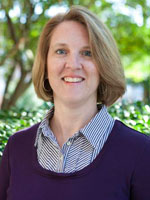
Position: Associate Professor of Mathematics
Teaching at Samford since: 2000
In addition to her teaching assignments, Dr. Hynds serves as Samford's faculty representative to the NCAA.
Why do you teach? I teach because I genuinely enjoy being part of the moment when someone "gets it." My mom likes recounting a story of a neighbor child running in from our back yard yelling "She teached me, she teached me!" As a child myself I had been able to explain to the other child how to pump her legs and keep the swing going. I guess that was my first success and I was hooked. More specifically, I teach college students because I am passionate about that age group. Students develop so much as a whole person during the college years and I love being a part of that.
What is one thing you want your students to know when they graduate from Samford? When my students graduate from Samford I want them to know that their eternity is more important than their next 40+ years. My hope is that when they leave here they feel confident about both. I want them to know that we care about them as whole people and want to equip them for life, career, family, trials and triumphs; all of it.
How did your background prepare you for your current role at Samford? I was raised and surrounded by fantastic, dedicated teachers. My grandfather taught chemistry at Clemson University for almost 40 years. My father was a math professor at the University of South Carolina for 35 years. (Yes, they got along!) My mother had her master's degree in German and taught high school from the time I was 16 until she recently retired. By their examples I was taught to love learning and to love sharing knowledge with others.
You teach in a discipline that often is unfairly maligned. Why is mathematics important to a well-rounded education and person? I think when cornered, most people would admit that mathematical skill is important. The reason it is maligned is because it is difficult. We typically do not like things that make us struggle (like exercise) but we love it when we get it. Often mathematics is poorly taught and it is easy to think if we will not use a particular skill, the entire process is useless or unimportant. We are teaching methods of thinking and reasoning, which is why it is important; however, that can get lost in the details.
You serve as Samford's NCAA faculty representative. What does that involve? Broadly I am the liaison between faculty and athletics, between athletics and the administration, and between Samford and the NCAA. In the Southern Conference, the 10 FARs are the voting body. Per a previous FAR, when I am with athletics, I represent faculty. When I'm with faculty, I represent athletics. I am to be about the business of ensuring the well-being of our student-athletes. I also am a part of waivers, violations, coach testing and a host of other administrative items. There are many facets of this position, and I'm still learning.
